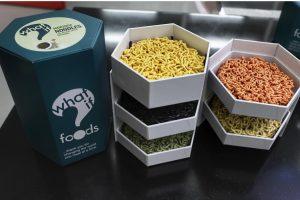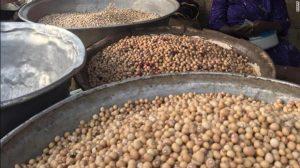(CNN)There are more than 300,000 edible plant species. However, in 2018, only four crops comprised 50% of the global production, and three of them -rice, maize, and wheat- were responsible for the majority of total exports.
Christoph Langwallner, co-founder and the CEO of WhatIf Foods, wants to alter this. His startup is on a mission to diversify the food system with an environmentally-friendly crop that Langwallner says can restore degraded land, cut water consumption, improve our diet and increase food security: the Bambara groundnut.
The groundnut is durable and drought-resistant. Bambara groundnut belongs to various legumes, which is the same food group as peas, peanuts, and beans. It is a native of West Africa but is currently grown across the continent and Asia.
As a legume, it enhances soils with nitrogen used to fertilize other crops. It’s also a “complete food” high in carbohydrates, protein, and fiber. It also provides amino acids and minerals, and vitamins. It is a traditional ingredient in indigenous African cuisine. The plant was mostly consumed and traded locally to now.
WhatIf Foods, based in Singapore, is a processor of the Bambara groundnut into its trademark “BamNut” flour which it utilizes to make instant soups, noodles, and shakes. Langwallner is hoping to create an industry that is new to the plant and “makes the Bambara groundnut part of the system.”
Planet-positive noodles
Langwallner, who worked with food tech companies previously, believes that he saw an opportunity to introduce the new groundnut by using a well-known instant noodles product. In 2020, more than 116 million servings of fast food were consumed.
WhatIf introduced its noodles in Singapore in 2020. The noodles will replace the deep-frying method employed in traditional instant noodle production by using a more healthy method similar to air-frying.

WhatIf has made four noodle flavors: BamNut, moringa, charcoal and pumpkin.
This unique method lowers the fat content of the noodles. It eliminates using palm oil which is a component that is linked to deforestation and polluting water and soil, according to Langwallner. They also have more protein and fiber than traditional instant noodles made from wheat.
At as high as $2.50 per serving, the noodles can be more costly than the products made by industry veterans like Nissin and Indomie However, Langwallner’s betting on the desire from environmentally conscious consumers, especially Gen-Z and millennials and willing to pay more for a greener product.
Supply is limited
Despite being very nutritious and beneficial to soils, Bambara groundnuts are grown on a tiny scale. The annual harvest in Africa is believed to be only 0.3 million tonnes, which is a tiny quantity compared with 776.6 million tonnes of wheat produced worldwide in the year 2000.
According to Victoria Jideani, a food scientist at the Cape Peninsula University of Technology in South Africa, this is because the Bambara groundnut is not cultivated for primary use. According to her, farmers cultivate it to improve soil fertility, and the fruit that results is consumed and sold locally.
However, creating global markets to sell the crops can offer new incentives to farmers — and improve the security of food for future generations if climate change affects the cultivation of certain crops, according to Jideani.
As per the United Nations, 23 hectares of arable soil are destroyed by desertification and drought each minute. Research has revealed that aridity affects 40% of agricultural soil. Many arable lands are where the mainstay crops such as maize previously grew and are “no longer thriving,” says Jeanie. This is a huge issue in Africa, with most of the land being destroyed.

Bambara groundnuts (pictured) are grown in semi-arid regions in Asia and Africa, including Ghana where WhatIf is working with over 1,600 farmers.
However, it is worth noting that the Bambara groundnut is drought-resistant and can thrive in soils that are poor in semi-arid areas and replenish land that has been degraded, providing a different crop that can help restore the soil says Jideani.
Companies such as WhatIf could generate worldwide interest in this “underutilized” crop, says Jideani. “The interaction we have had with (the farmers) indicates that they are looking for a market,” she declares.
And Langwaller’s not the only one exploring the possibilities of this crop: Jideani and her team are exploring Bambara groundnut-based products, including cakes, crackers, and tofu.
Jideani claims she’d like to see governments encourage Bambara to produce groundnuts. “Any crop that presents itself as a solution for the future should be grabbed with two hands,” she says.
“A totally different approach”
So far, Langwallner and co-founder Peter Cheetham, an engineer in biochemistry, have invested their funds to run the business and raise funds from private investors and friends. Langwallner claims they are seeking institution-level investors who can help the business grow.
The company is working towards its first major milestone, which is to source 1,000 metric tons of Bambara groundnuts from West Africa, which Langwallner claims will restore up to 1,000 hectares of agricultural land before 2023’s close. It’s working directly with 1600 farmers in Ghana and is establishing connections between farmers of Nigeria and Malaysia as it plans for the possibility of expansion in the future. Langwallner was not willing to divulge figures of sales to CNN Business.

WhatIf’s dairy-free BamNut milk is high in protein and dietary fiber.
The products of WhatIf are manufactured in its factories located, which are located in Malaysia and Australia, and distributed through Singapore, Malaysia, and Australia. This month, they’re being launched in the US through online stores. Additionally, the company has been obtaining approval from the regulators in the EU and expects to be completed by the end of this year.
Shortly, WhatIf wants to “localize production” by the construction of factories nearer to its groundnut supply or nearer to the customers, according to Langwallner. WhatIf is also expanding its product offerings. The company recently introduced BamNut milk and is currently exploring the possible development of other dairy products made from plants like cheese and yogurt.
In taking the “totally different approach,” Langwallner hopes Bambara groundnuts can help farmers worldwide revive damaged lands and diversify their diets for a more secure and sustainable future.
